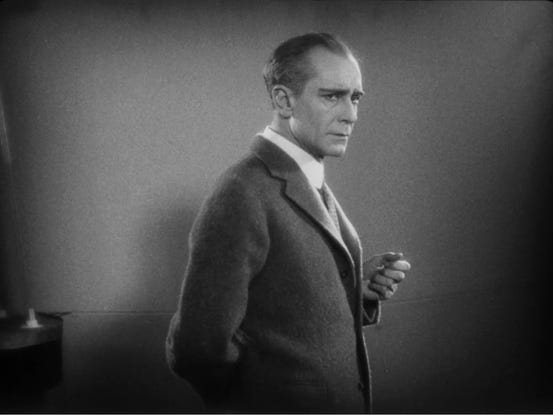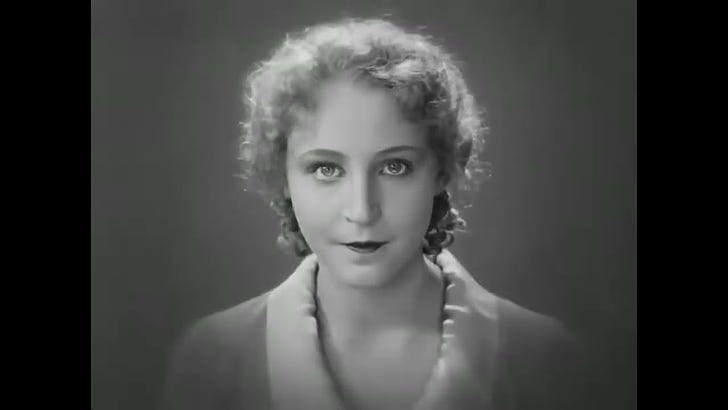This piece is part of my ongoing translation of the novel of Thea von Harbou’s “Metropolis”. If you’d like to find out more about the project or see other chapters, check out the essay below:

Joh Fredersen came to his mother's house.
Death had passed over Metropolis. Armageddon and Last Judgement had shouted, from the roars of explosions and the clanging of the cathedral bells. But Joh Fredersen found his mother as he always found her: in the wide, soft chair by the open window, the dark rug over her paralysed knees, the mighty Bible on the sloping table before her, and in her beautiful old-lady hands, the delicate figured lace with which she was sewing.
She turned her eyes towards the door and perceived her son.
The expression of bitter severity on her face became more bitter and more severe. She said nothing. But about her closed mouth was an inclination which said: You are in a bad way, Joh Fredersen...
And she examined him like a judge.
Joh Fredersen took his hat from his head. Then she saw the white hair above his brow...
"Child!" she said quietly, reaching her hands out towards him.
Joh Fredersen fell on his knees by his mother's side. He threw his arms around her, pressing his head into the lap which had borne him. He felt her hands on his hair, and felt how she touched it, as if fearful of hurting him, as though this white hair was the mark of an unhealed wound close to the heart, and he heard her dear voice saying:
"My poor child..."
The rustling of the walnut tree by the window filled a long silence with longing and affection. Then Joh Fredersen began to speak. He spoke with the eagerness of a man bathing himself in holy water, with the fervour of a conquered confessor, with the redemption of one ready to do any penance, and who had been pardoned. His voice was soft, and sounded as though it came from far away, from the farthest bank of a wide river.
He spoke of Freder, then his voice completely failed him. He raised himself from his knees and walked through the room. When he turned around, there was a smiling loneliness in his eyes, and knowledge of the necessary renunciation a tree makes when its fruit is ripe.
"It seemed to me," he said, gazing into space, "as though I saw his face for the first time… How he spoke to me this morning… It is a strange face, mother. It is certainly my face—and yet certainly his own. It is the face of his beautiful, dead mother—and yet, at the same time, it is modelled on Maria's features, as though he were born for a second time from this young, virginal creature. But it is, at the same time, the face of the masses—familiar to him, related to him, as near to him as brothers..."
"How did you come to know the face of the masses, Joh?" asked his mother, gently.
For a long time, Joh Fredersen gave no answer.
"You are right to ask that, mother," he then said. "From the heights of the New Tower of Babel I could not recognise it. And in the night of madness, in which I got sight of it for the first time, it was so distorted in its own horror that it did not resemble itself any more.
"But as I stepped out of the cathedral door this morning, the masses were standing as one man, looking towards me. Then, the face of the masses turned towards me. Then I saw it was not old, yet not young; it was sorrowless, yet joyless.
‘What do you want?’ I asked. And one answered: ‘We are waiting, Mr. Fredersen...’
‘For what?’ I asked him.
‘We are waiting,’ continued the spokesman, ‘for someone to come who will tell us which way we should go...’”
"And you want to be this one, Joh?"
"Yes, mother."
"And will they trust you?"
"I do not know, mother. If we had been living a thousand years earlier, I would maybe head out on a country road, with a pilgrim's staff and cockle hat, and seek the way to the Holy Land, not returning home until I had cooled my feet, hot from wandering, in the Jordan, and worshipped the Redeemer in places of redemption... And if I were not the man I am, it might have come to pass that I would set out on a journey along the roads of men who walk in the shadows. I would, perhaps, sit with them in the corners of misery and learn to comprehend their groans and their curses which a hellish life has transformed their prayers into... Because, from comprehension comes love, and I am longing to love mankind, mother… But I believe that action is better than pilgrimages, and that a good deed has more worth than the best of words. I believe, too, that I shall find the way to do so, for there are two standing by me who wish to help me."
"Three, Joh."
The eyes of the son sought the gaze of the mother.
"Who is the third supposed to be?"
"Hel."
"Hel?"
"Yes, child."
Joh Fredersen remained silent.
She turned back the pages of her Bible, until she found what she was searching for. It was a letter. She took it and said, still holding it affectionately: "This letter came to me from Hel before she died. She asked me to give it you, when, as she said, you had found your way home to me and to yourself."
Soundlessly moving his lips, Joh Fredersen reached out his hand for the letter.
The yellowish envelope contained only a thin sheet of paper. Upon it stood, in the handwriting of a girlish woman:
I am going to God and do not know when you will read these lines, Joh. But I know: One day you will read them. And, until you come, I will exhaust the eternal bliss in praying God to forgive me, for I made use of two sayings from His Holy Book in order to give you my heart, Joh. One is: ‘I have loved thee with an everlasting love.’ The other: ‘Lo, I am with you always, even unto the end of the world.’
Hel.
It took Joh Fredersen a long time before he succeeded in placing the thin lettersheet back in the envelope. His eyes gazed through the open window by which his mother sat. Drawing across the soft, blue sky, he saw great, white clouds; they were like ships, laden with treasures from a distant world.
"What are you thinking of, child?" asked his mother's voice, with care.
But Joh Fredersen gave her no answer. His heart, utterly redeemed, spoke stilly within him: Unto the end of the world… Unto the end of the world.
THE END



